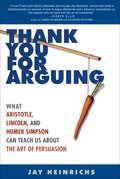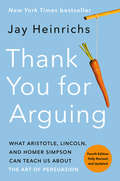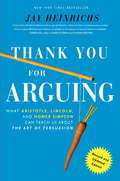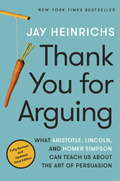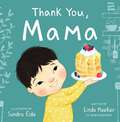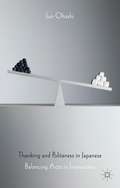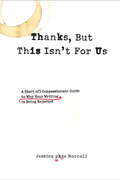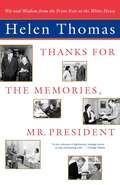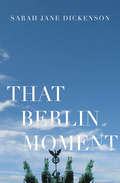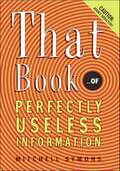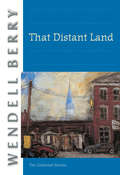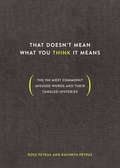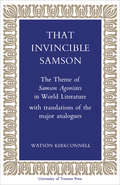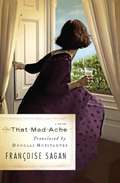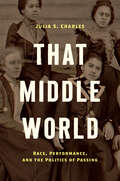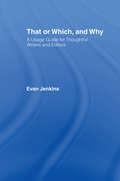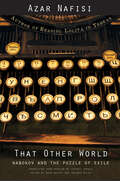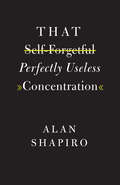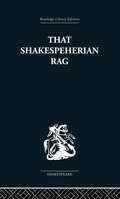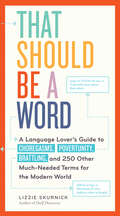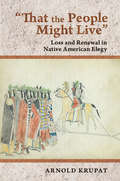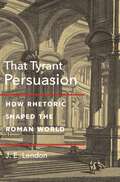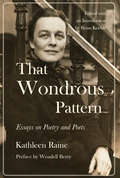- Table View
- List View
Thamizh (Tamil) 10th Standard - Tamilnadu Board
by State Council of Educational Research TrainingTamil Textbook for the 10th Standard Students, preparing for Tamil Nadu State Board Exam.
Thank You for Arguing: What Aristotle, Eminem and Homer (Simpson) Can Teach Us About the Art of Persuasion
by Jay HeinrichsThank You for Arguing is your master class in the art of persuasion, taught by professors ranging from Bart Simpson to Winston Churchill. The time-tested secrets the book discloses include Cicero's three-step strategy for moving an audience to action as well as Honest Abe's Shameless Trick of lowering an audience's expectations by pretending to be unpolished. But it's also replete with contemporary techniques such as politicians' use of "code" language to appeal to specific groups and an eye-opening assortment of popular-culture dodges, including: The Eddie Haskell Ploy; Eminem's Rules of Decorum; The Belushi Paradigm; Stalin's Timing Secret; The Yoda Technique. Whether you're an inveterate lover of language books or just want to win a lot more anger-free arguments on the page, at the podium, or over a beer, Thank You for Arguing is for you. Written by one of today's most popular online language mavens, it's warm, witty, erudite, and truly enlightening. It not only teaches you how to recognize a paralipsis and a chiasmus when you hear them, but also how to wield such handy and persuasive weapons the next time you really, really want to get your own way.
Thank You for Arguing, Fourth Edition (Revised and Updated): What Aristotle, Lincoln, and Homer Simpson Can Teach Us About the Art of Persuasion
by Jay HeinrichsThe definitive guide to getting your way, revised and updated with new material on writing, speaking, framing, and other key tools for arguing more powerfully &“Cross Cicero with David Letterman and you get Jay Heinrichs.&”—Joseph Ellis, Pulitzer Prize–winning author of The Quartet and American Sphinx Now in its fourth edition, Jay Heinrichs&’s Thank You for Arguing is your master class in the art of persuasion, taught by history&’s greatest professors, ranging from Queen Victoria and Winston Churchill to Homer Simpson and Barack Obama. Filled with time-tested secrets for emerging victorious from any dispute, including Cicero&’s three-step strategy for inspiring action and Honest Abe&’s Shameless Trick for lowering an audience&’s expectations, this fascinating book also includes an assortment of persuasion tips, such as: • The Chandler Bing Adjustment: Match your argument to your audience (that is, persuasion is not about you).• The Belushi Paradigm: Before people will follow you, they have to consider you worth following. • The Yoda Technique: Transform a banal idiom by switching the words around. Additionally, Heinrichs considers the dark arts of persuasion, such as politicians&’ use of coded language to appeal to specific groups. His sage guide has been fully updated to address our culture of &“fake news&” and political polarization. Whether you&’re a lover of language books or just want to win more anger-free arguments on the page, at the podium, or over a beer, Thank You for Arguing is for you. Warm, witty, and truly enlightening, it not only teaches you how to identify a paraleipsis when you hear it but also how to wield such persuasive weapons the next time you really, really need to get your way. This expanded edition also includes a new chapter on how to reset your audience&’s priorities, as well as new and improved ArgueLab games to hone your skills.
Thank You For Arguing, Revised and Updated Edition
by Jay HeinrichsFor when you really have to get your point across... *Expanded and Revised: Including new chapters on leadership, Obama's oratorical mastery, the pitfalls of apologies--and an "Argument Lab" section to put your new skills to the test.* Thank You for Arguing is your master class in the art of persuasion, taught by professors ranging from Bart Simpson to Winston Churchill. The time-tested secrets this book discloses include Cicero's three-step strategy for moving an audience to action--as well as Honest Abe's Shameless Trick of lowering an audience's expectations by pretending to be unpolished. But it's also replete with contemporary techniques such as politicians' use of "code" language to appeal to specific groups and an eye-opening assortment of popular-culture dodges--including The Yoda Technique, The Belushi Paradigm, and The Eddie Haskell Ploy. Whether you're an inveterate lover of language books or just want to win a lot more anger-free arguments on the page, at the podium, or over a beer, Thank You for Arguing is for you. Written by one of today's most popular language mavens, it's warm, witty, erudite, and truly enlightening. It not only teaches you how to recognize a paralipsis and a chiasmus when you hear them, but also how to wield such handy and persuasive weapons the next time you really, really want to get your own way.
Thank You for Arguing, Third Edition
by Jay HeinrichsA master class in the art of persuasion, as taught by professors ranging from Bart Simpson to Winston Churchill, newly revised and updated. The time-tested secrets taught in this book include Cicero's three-step strategy for moving an audience to action, and Honest Abe's Shameless Trick for lowering an audience's expectations. And it's also replete with contemporary techniques such as politicians' use of code language to appeal to specfic groups and an eye-opening assortment of persuasive tricks, including the Eddie Haskell Ploy, the Belushi Paradigm, Stalin's Timing Secret, and the Yoda Technique. Whether you're an inveterate lover of language books or just want to win a lot more anger-free arguments on the page, at the podium, or over a beer, Thank You for Arguing is for you. Warm, witty, erudite, and truly enlightening, it not only teaches you how to recognize a paralipsis when you hear it, but also how to wield the weapons of persuasion the next time you really, really, want to get your own way.
Thank You, Mama (Grey & Mama)
by Linda MeekerTikTok and viral video star Grey (@greyandmama) says "Thank you, Mama!" to healthy foods in this picture book that teaches gratitude, manners, and the joy of sharing meals with those we love.We all want to raise happy eaters who enjoy trying new foods, mealtimes with family, and being thankful. That's why so many parents love Linda Meeker's charming videos of her son Grey saying "Thank you, Mama!" With colorful illustrations that capture a child's daily snacks and mealtimes, Thank You, Mama will delight parents and kids alike as it follows a little boy exploring different foods—from vegetables to sushi—and trying to pick his favorite.This playful picture book for 3- to 7-year-oldsencourages children to try new foods and become happy, healthy eatershonors the bond between parent and childmodels respect, manners, and thankfulnessbuilds vocabulary and prereading skills with colorful food illustrations paired with words for each itemThis debut children's book from TikTok and Instagram stars Grey and Mama (@greyandmama, 7M followers) is the perfect story forParents and grandparents who want to instill good habits and gratitude from a young ageAny family eager to celebrate the love of food and family that develops over shared mealsBaby showers, birthdays, holiday gift giving, or to a little one scared to try new foodsThis cheerful story about an adorable, curious, and kind child will have your kids saying "thank you"—and maybe even giving those peas a chance!
Thanking and Politeness in Japanese
by Jun OhashiThis book synthesizes previous work on thanking, politeness and Japanese pragmatics and crystallises the theoretical underpinnings of thanking, how it is realized linguistically and the social meaning and significance of this aspect of Japanese communication.
Thanks, But This Isn't for Us
by Morrell Jessica PageA fun, practical guide that reveals the essentials of good fiction and memoir writing by exposing the most common mistakes literary writers make. All great works of fiction and memoir are unique-but most bad novels, stories, and memoirs have a lot in common. From clunky dialogue to poorly sketchedout characters, sagging pacing to exaggerated prose, these beginners' mistakes drive any agent or editor to their stock rejection letter, telling the aspiring writer "Thanks, but this isn't for us," and leaving many to wonder what exactly it is that they're doing wrong. Veteran writing coach, developmental editor, and writing instructor Jessica Page Morrell will fill in the gaps in every rejection letter you've ever received. In Thanks, But This Isn't for Us, Morrell uses her years of experience to isolate the specific errors beginners make, including the pitfalls of unrealistic dialogue, failing to "show, not tell," and over-the-top plot twists. These are just a few of the problems that keep writers from breaking through with their work. Sympathetic and humane, but pulling no punches, Thanks, But This Isn't for Us shows writers precisely where they've gone wrong and how to get on the right track. In sixteen to-the-point chapters, with checklists, exercises, takeaway tips, and a glossary, Morrell helps readers transcend these mistakes so that they don't have to learn the hard way: with another rejection letter. .
Thanks for the Memories, Mr. President
by Helen ThomasIn a natural follow-up to her national bestseller Front Row at the White House, the dean of the White House press corps presents a vivid and personal presidential chronicle. Currently a columnist for Hearst and a former White House bureau chief for UPI, Helen Thomas has covered an unprecedented nine presidential administrations, endearing herself with her trademark "Thank you, Mr. President," at the conclusion of White House press conferences. Thomas has amassed many wonderful tales about her personal interactions with and observations of the presidents and their families that can all be found in Thanks for the Memories, Mr. President. In nine riveting chapters -- one for each administration -- Thomas delights, informs, spins yarns, and offers opinions on the commanders in chief, from Kennedy through George W. Bush. In these accounts, Thomas reveals Kennedy's love of sparring with the press, the unique invitation LBJ extended to Hubert Humphrey to become his running mate, and Reagan's down-home ways of avoiding the press's tougher questions. This book is as entertaining and compelling as Helen Thomas herself.
That Berlin Moment
by Sarah Jane DickensonBold, challenging and compelling That Berlin Moment is a play for four adult characters, two female and two male, which explores how memory is more about the present and the future than the past. 'Why don't I feel husband? I look at you and I don't feel husband, I smell you and I don't smell husband, I look at you and I -' A tragic accident has robbed Alex of her memory. Her attentive husband is eager to fill the gaps for her. But the more he tells her the more she hates who he tells her she is. Determined not to remember at all costs and with the help of a young doctor with a head full of maverick theories and a very new stethoscope, she agrees to meet the mysterious fellow patient, Stranger. Together they begin to explore and enjoy the present, but it soon becomes clear that his memories won't stay forgotten with terrifying consequences for both them and the Doctor.
That Book: ...of Perfectly Useless Information
by Mitchell SymonsDid you know that . . .John Wayne once won the dog Lassie from its owner in a poker game?Hijinks is the only word in the English language with three dotted letters in a row?The shortest war in history, between England and Zanzibar in 1896, lasted only thirty-eight minutes?Want to learn which U.S. president was a descendant of King Edward III? Or which famous people lived to read their own obituaries? Then That Book is the book for you! From history to science to pop culture, here is an irresistible, enlightening, and absolutely addictive treasure trove of fascinating and fun little-known facts that no one needs to know—an indispensable boon to every true lover of trivia and marvelous minutia!
That Distant Land: The Collected Stories (Port William Ser.)
by Wendell BerryOriginally published in 2005, That Distant Land brings together twenty–three stories from the Port William Membership. Arranged in their fictional chronology, the book is not an anthology so much as it is a coherent temporal mapping of this landscape over time, revealing Berry’s mastery of decades of the life lived alongside this clutch of interrelated characters bound by affection and followed over generations.This volume combines the stories found in The Wild Birds (1985), Fidelity (1992), and Watch with Me (1994), together with a map and a charting of the complex and interlocking genealogies.
That Doesn't Mean What You Think It Means: The 150 Most Commonly Misused Words and Their Tangled Histories
by Ross Petras Kathryn PetrasAn entertaining and informative guide to the most common 150 words even smart people use incorrectly, along with pithy forays into their fascinating etymologies and tangled histories of use and misuse. Even the most erudite among us use words like apocryphal, facetious, ironic, meteorite, moot, redundant, and unique incorrectly every day. Don’t be one of them. Using examples of misuse from leading newspapers, prominent public figures and famous writers, among others, language gurus Ross Petras and Kathryn Petras explain how to avoid these perilous pitfalls in the English language. Each entry also includes short histories of how and why these mistake have happened, some of the (often surprisingly nasty) debates about which uses are (and are not) mistakes, and finally, how to use these words correctly … or why to not use them at all. By the end of this book, every literati will be able to confidently, casually, and correctly toss in an “a priori” or a “limns” without hesitation.
That Invincible Samson: The Theme of Samson Agonistes in World Literature
by Watson KirkconnellThis work examines the more than one hundred analogues of Samson Agonistes, about half of them written earlier than Milton's drama. The author has gone back in every instance to primary sources, and examined all treatments of Milton's theme, in all languages, for their intrinsic interest and merit. While he has not entirely omitted a discussion of source relationships, his concern here has been chiefly with analogues. In Part I of the book the author compares five pre-Miltonic works, which he has translated, in whole or in part, from the original Latin, Dutch, and Italian. In Part II, a descriptive catalogue, he comments on the significance, to Miltonists and to the general reader, of the analogues. He traces the purposes beyond mere theatre in the different versions of the play: versions prior to 1670 contain many overtones of personal, national, or theological significance, while, after 1671, there is a rapid shift away from religious or moral presentation to a more strictly theatrical entertainment. Dr. Kirkconnell believes that this shift in interest has obscured from most of the critics of later centuries the tone and tradition of this great drama. The nineteenth and twentieth centuries have seen dozens of versions of the old play theme, nearly all of them wholly disregarding any inner drama of the spirit, and stressing extrovert aspects of Strength, Beauty, and Sex. As a whole, the analogues will reveal the variety that playwrights have found possible in the ancient theme. The author concludes that Milton's treatment is the noblest ever written, surpassing all others in literary quality and in the nature of the dramatic conflict it describes.
That Mad Ache: A Novel
by Douglas R. Hofstadter Francoise SaganThat Mad Ache, set in high-society Paris in the mid-1960's, recounts the emotional battle unleashed in the heart of Lucile, a sensitive but rootless young woman who finds herself caught between her carefree, tranquil love for 50-year-old Charles, a gentle, reflective, and well-off businessman, and her sudden wild passion for 30-year-old Antoine, a hot-blooded, impulsive, and struggling editor. As Lucile explores these two versions of love, she vacillates in confusion, but in the end she must choose, and her heart's instinct is surprising and poignant. Originally published under the title La Chamade, this new translation by Douglas Hofstadter returns a forgotten classic to English. In Translator, Trader, Douglas Hofstadter reflects on his personal act of devotion in rewriting Françoise Sagan's novel La Chamade in English, and on the paradoxes that constantly plague any literary translator on all scales, ranging from the humblest of commas to entire chapters. Flatly rejecting the common wisdom that translators are inevitably traitors, Hofstadter proposes instead that translators are traders, and that translation, like musical performance, deserves high respect as a creative act. In his view, literary translation is the art of making subtle trades in which one sometimes loses and sometimes gains, often both losing and gaining at the same time. This view implies that there is no reason a translation cannot be as good as the original work, and that the result inevitably bears the stamp of the translator, much as a musical performance inevitably bears the stamp of its artists. Both a companion to the beloved Sagan novel and a singular meditation on translation, Translator, Trader is a witty and intimate exploration of words, ideas, communication, creation, and faithfulness.
That Middle World: Race, Performance, and the Politics of Passing
by Julia S. CharlesIn this study of racial passing literature, Julia S. Charles highlights how mixed-race subjects invent cultural spaces for themselves—a place she terms that middle world—and how they, through various performance strategies, make meaning in the interstices between the Black and white worlds. Focusing on the construction and performance of racial identity in works by writers from the antebellum period through Reconstruction, Charles creates a new discourse around racial passing to analyze mixed-race characters' social objectives when crossing into other racialized spaces. To illustrate how this middle world and its attendant performativity still resonates in the present day, Charles connects contemporary figures, television, and film—including Rachel Dolezal and her Black-passing controversy, the FX show Atlanta, and the musical Show Boat—to a range of nineteenth- and early twentieth-century literary texts. Charles's work offers a nuanced approach to African American passing literature and examines how mixed-race performers articulated their sense of selfhood and communal belonging.
That or Which, and Why: A Usage Guide for Thoughtful Writers and Editors
by Evan JenkinsThat or Which, and Why is an insightful and witty guide to writing. Based on Evan Jenkins's long-running column 'Language Corner' in Columbia Journalism Review, the book is compiled of brief, alphabetically arranged entries on approximately 200 major writing stumbling blocks, from the wonderful world of 'that' and 'which' to trickier terrain like the correct usage of common idiomatic expressions.Working from his experiences as a newsroom editor and teacher, Jenkins' humorous tone puts the reader at ease, unlike many of the writing and usage guides out there that are off-putting in their rigidity and dogmatism. He takes the 'we're-all-in-this-together' approach to teaching better writing - maintaining a light tone throughout the book and emphasizing flexibility and easy-to-use guidelines rather than delivering orders from Grammar-on-high.
That Other World: Nabokov and the Puzzle of Exile
by Azar NafisiThe foundational text for the acclaimed international best seller Reading Lolita in Tehran&“Empathetic, incisive. . . . A sweeping overview of Nabokov's major works. . . . Graceful [and] discerning.&”—Kirkus ReviewsThe ruler of a totalitarian state seeks validation from a former schoolmate, now the nation&’s foremost thinker, in order to access a cultural cache alien to his regime. A literary critic provides commentary on an unfinished poem that both foretells the poet&’s death and announces the critic&’s secret identity as the king of a lost country. The greatest of Vladimir Nabokov&’s enchanters—Humbert—is lost within the antithesis of a fairy story, in which Lolita does not hold the key to his past but rather imprisons him within the knowledge of his distance from that past.In this precursor to her international best seller Reading Lolita in Tehran, Azar Nafisi deftly explores the worlds apparently lost to Nabokov&’s characters, their portals of access to those worlds, and how other worlds hold a mirror to Nabokov&’s experiences of physical, linguistic, and recollective exile. Written before Nafisi left the Islamic Republic of Iran, and now published in English for the first time and with a new introduction by the author, this book evokes the reader&’s quintessential journey of discovery and reveals what caused Nabokov to distinctively shape and reshape that journey for the author.
That Self-Forgetful Perfectly Useless Concentration
by Alan ShapiroMore than a gathering of essays, That Self-Forgetful Perfectly Useless Concentration is part memoir, part literary criticism, and an artful fusion of the two. It is an intimate portrait of a life in poetry that only Alan Shapiro could have written. In this book, Shapiro brings his characteristic warmth, humor, and many years as both poet and teacher to bear on questions surrounding two preoccupations: the role of conventions--of literary and social norms--in how we fashion our identities on and off the page, and how suffering both requires and resists self-expression. He sketches affectionate portraits of his early teachers, revisits the deaths of his brother and sister, and examines poems that have helped him navigate troubled times. Integrating storytelling and literary analysis so seamlessly that art and life become extensions of each other, Shapiro embodies in his lively prose the very qualities he celebrates in the poems he loves. Brimming with wit and insight, this is a book for poets, students and scholars of poetry, teachers of literature, and everyone who cares about the literary arts and how they illuminate our personal and public lives.
That Shakespeherian Rag: Essays on a critical process
by Terence HawkesFirst published in 1986. This collection of essays focuses on the ways in which our society 'processes' Shakespeare and the purposes for which this seems to be done. The case is made by examining the work of four highly influential critics: A C Bradley, Walter Raleigh, T S Eliot and John Dover Wilson. Terence Hawkes asks whether, beyond the readings to which the plays may be subjected, there lies any final, authoritative or essential meaning to which we can ultimately turn, concluding that jazz music offers the most fruitful model for twentieth-century criticism.
That Should Be a Word: A Language Lover's Guide to Choregasms, Povertunity, Brattling, and 250 Other Much-Needed Terms for the Modern World
by Lizzie SkurnickFinally there’s a word for it: Fidgital—excessively checking one’s devices. Martyrmony—staying married out of duty. Author of the highly popular “That Should Be a Word” feature in the New York Times Magazine, Lizzie Skurnick delights word lovers with razor-sharp social commentary delivered via clever neologisms. That Should Be a Word is a compendium of 244 of Skurnick’s wittiest wordplays—more than half of them new—arranged in ingenious diagrams detailing their interrelationships. Complete with definitions, pronunciations, usage examples, and illustrations, That Should Be a Word features words on our obsession with food: carbiter—one who asserts that someone else cannot be hungry. On social media, like twiticule—to mock someone in 140 characters. On the modern family, like brattle—to discuss one’s children at great length, which leads to words like spamily—Facebook or Twitter updates about kids—and spawntourage—a group of approaching strollers. From highlighting the profound financial anxiety of a post-recession society (bangst) to mocking the hyper-vain celebrity circle that abstains from anything of import (celebracy), That Should Be a Word delves deep into all the most humorous, and maddening, aspects of life in the 21st century.
That Summer in Paris: Memories of Tangled Friendships with Hemingway, Fitzgerald, and Some Others
by Morley Callaghan"That Summer In Paris" brings to the fore the fabulous summer of 1929 when the literary capital of North America moved to La Rive Gauche--the Left Bank of the Seine River--in Paris. Ernest Hemingway was reading proofs of "A Farewell to Arms", and a few blocks away F. Scott Fitzgerald was struggling with "Tender Is the Night". As his first published book rose to fame in New York, Morley Callaghan arrived in Paris to share the felicities of literary life, not just with his two friends, Hemingway and Fitzgerald, but also with fellow writers James Joyce, Ford Madox Ford, and Robert McAlmon. Amidst these tangled relations, some friendships flourished while others failed.
"That the People Might Live": Loss and Renewal in Native American Elegy
by Arnold KrupatThe word "elegy" comes from the Ancient Greek elogos, meaning a mournful poem or song, in particular, a song of grief in response to loss. Because mourning and memorialization are so deeply embedded in the human condition, all human societies have developed means for lamenting the dead, and, in "That the People Might Live" Arnold Krupat surveys the traditions of Native American elegiac expression over several centuries.Krupat covers a variety of oral performances of loss and renewal, including the Condolence Rites of the Iroquois and the memorial ceremony of the Tlingit people known as koo'eex, examining as well a number of Ghost Dance songs, which have been reinterpreted in culturally specific ways by many different tribal nations. Krupat treats elegiac "farewell" speeches of the eighteenth and nineteenth centuries in considerable detail, and comments on retrospective autobiographies by Black Hawk and Black Elk.Among contemporary Native writers, he looks at elegiac work by Linda Hogan, N. Scott Momaday, Gerald Vizenor, Sherman Alexie, Maurice Kenny, and Ralph Salisbury, among others. Despite differences of language and culture, he finds that death and loss are consistently felt by Native peoples both personally and socially: someone who had contributed to the People's well-being was now gone. Native American elegiac expression offered mourners consolation so that they might overcome their grief and renew their will to sustain communal life.
That Tyrant, Persuasion: How Rhetoric Shaped the Roman World
by J. E. LendonHow rhetorical training influenced deeds as well as words in the Roman EmpireThe assassins of Julius Caesar cried out that they had killed a tyrant, and days later their colleagues in the Senate proposed rewards for this act of tyrannicide. The killers and their supporters spoke as if they were following a well-known script. They were. Their education was chiefly in rhetoric and as boys they would all have heard and given speeches on a ubiquitous set of themes—including one asserting that &“he who kills a tyrant shall receive a reward from the city.&” In That Tyrant, Persuasion, J. E. Lendon explores how rhetorical education in the Roman world influenced not only the words of literature but also momentous deeds: the killing of Julius Caesar, what civic buildings and monuments were built, what laws were made, and, ultimately, how the empire itself should be run.Presenting a new account of Roman rhetorical education and its surprising practical consequences, That Tyrant, Persuasion shows how rhetoric created a grandiose imaginary world for the Roman ruling elite—and how they struggled to force the real world to conform to it. Without rhetorical education, the Roman world would have been unimaginably different.
That Wondrous Pattern: Essays on Poetry and Poets
by Kathleen Raine“There is no exaggeration in pointing out that these essays are addressed to the soul of the reader. They are not academic exercises in erudition as a contribution to ‘Eng. Lit.’” —from the introduction by Brian Keeble Kathleen Raine was one of the greatest British poets of the last century. Born to a deeply literary and spiritual household, she went on to study at Cambridge, where she met Jacob Bronowski, William Empson, and Malcolm Lowry. A dedicated neoPlatonist, she studied and presented the works of Thomas Taylor and wrote seminal books on William Blake. With Keith Critchlow, Brian Keeble, and Philip Sherrard, she founded, in 1981, the Temenos Academy of Integral Studies, its journal Temenos, and, later, the Temenos Academy Review. HRH The Prince of Wales became the patron of the academy in 1997.For our new selection, That Wondrous Pattern, Raine offers sixteen essays that range from “The Inner Journey of the Poet” and “What Is Man?” to essays on Blake, Wordsworth, Hopkins, Yeats, Eliot, and several others. The centerpiece, “What Is the Use of Poetry?”, is a rigorous defense of the great art. Editor Brian Keeble himself contributes a fascinating introduction to Raine’s work, and Wendell Berry, a colleague and friend of hers, offers a preface.All who spend time in the presence of this wonderful writer will leave newly entranced with the art and use of the beautiful, convinced that “it is only in moments when we transcend ourselves that we can know anything of value.

